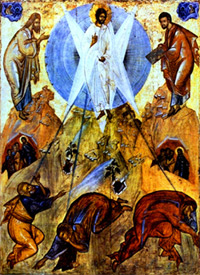 Next Wednesday is the Feast of the Transfiguration. What that means is that next Wednesday is a major holy day for Christians like me who fall into what is commonly referred to as the "liturgical" category of the faith. That rather ponderous label is a sobriquet of sorts for those of us who are Anglicans or Roman Catholic or Eastern Orthodox and like to have history and the ancient traditions of the early church ever-present in, and informing of, our worship in the here and now.
Next Wednesday is the Feast of the Transfiguration. What that means is that next Wednesday is a major holy day for Christians like me who fall into what is commonly referred to as the "liturgical" category of the faith. That rather ponderous label is a sobriquet of sorts for those of us who are Anglicans or Roman Catholic or Eastern Orthodox and like to have history and the ancient traditions of the early church ever-present in, and informing of, our worship in the here and now.
By and large, our penchant for ceremony and antiquity makes for a more colorful form of Christian worship than is observed in non-liturgical services. It also makes for considerably more drama. It's the drama that makes my heart sing ... not only the drama of liturgical services, but also the fact that liturgical congregations are always inclined toward employing drama to enhance worship, deepen commitment, and increase their own experience and perception of the faith, as well as that of others.
For us, the Feast of the Transfiguration is one of the church's 12 Great Feast Days. That is, it's right on up there with the Nativity [Christmas] and the Feast of the Resurrection [Easter,] at least in religious terms, if not popular or cultural ones. It calls us to remember the apex or culminating event of Jesus' public life in which, on a mountaintop and in full view of Peter, James, and John, Jesus was transfigured into a radiance beyond their later description. Moses and Elijah were also present during the Transfiguration itself, one on either side of him; and even as the gathered apostles watched, a bright cloud overshadowed them and a voice, speaking from the cloud, said, "This is my son, the Beloved; and with him I am well pleased. Listen to him." From that moment on, the course of history was set and, in many ways, the church was born.
The Greek word used in the New Testament accounts of the events on the Mount of the Transfiguration is metamorphothe. While the ages have translated that word as transfigured, it actually comes closer to conveying something English can't quite convey. It wants to say something like "changed shape and beingness and allness into some other form thereof," or something equally awkward and wordy. What happened, in other words and in the fullest sense, was a "metamorphosis," which again is Greek and again has no really clear or felicitous analog in English.
That very impossibility of language, its very failure to convey some substances, its fractures and chips as a vessel for meaning have, over the years, come to be for me the central wonder of the Feast of the Transfiguration. Being convicted of something one can neither own nor ingest, articulate nor incarnate, is itself a glory beyond our grasping, whether we be ancient apostles or God's newest converts ... which says to me that the great truth of next Wednesday's Feast of the Transfiguration just may be that experiencing God always lies just beyond the reach of articulated theology, and never within it.
 Phyllis Tickle (www.phyllistickle.com) is the founding editor of the religion department of Publishers Weekly and author of The Words of Jesus: A Gospel of the Sayings of Our Lord and the forthcoming fall release, The Great Emergence: How Christianity Is Changing and Why.
Phyllis Tickle (www.phyllistickle.com) is the founding editor of the religion department of Publishers Weekly and author of The Words of Jesus: A Gospel of the Sayings of Our Lord and the forthcoming fall release, The Great Emergence: How Christianity Is Changing and Why.
Got something to say about what you're reading? We value your feedback!
